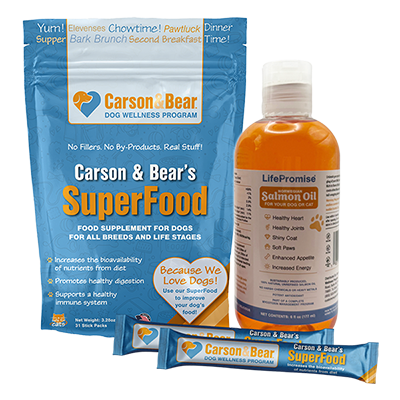One of the greatest joys as a pet parent is having our furry companions by our side to experience all of the changes and new experiences life has to throw at us. We want them there to support us through the many different chapters of our lives, so it’s important that we support them through theirs as well, specifically when it comes to their age and diet today as well as throughout their years.
While there are many essentials for all dogs’ diets no matter their age, there are some specific nutrition requirements that help address specific health needs and various times of their life. From nurturing a playful puppy to supporting the laid-back senior dog, here are some things to keep in mind to ensure you’re feeding your dog the best dog food to thrive at every stage of their life.

Puppies need help growing up
When it comes to diets for young dogs, it’s important to get them started off on the right paw with a nutritionally balanced and complete diet to lay a strong foundation for their rapid growth and development. Protein in dog food is one of the most important building blocks during this period, and your attention to it will go a long way toward their overall health for years to come. High-quality animal protein sources are valuable for all dogs but especially for puppies to support proper muscle and tissue development. Additionally, healthy fats play a key role in brain development, as well as healthy fur and skin so ensure they are a part of your dog’s diet.
It’s important to note that puppies need more protein than older dogs, and their food should offer over 30% of protein – though the requirement for your puppy will depend on their breed, size, activity level, and any existing health concerns. Calcium and phosphorous are also key ingredients to be mindful of during this phase of development – specifically for bones and teeth.
Aside from the ingredients, you should also consider the quantity and frequency of their meals. While their rumbling, stumbling activity will burn more calories and require more food, their stomachs aren’t big enough for them to woof down large meals. It’s best to feed puppies smaller, more frequent meals throughout the day for the first three- to six-months of their life before transitioning to two meals per day. However, some adult dogs need more than two meals per day, especially for small breeds and dogs prone to gastric dilation, so always consult with your vet before making any changes.

Adult dogs should eat to prevent
By the time dogs reach adult status, they’re typically fully grown physically, but their dietary needs can still evolve. In this stage of life, the focus of their food should shift from negating growing pains to maintaining optimal health and building toward a healthy senior life. Making sure their diet is complete and balanced will be key during this time and will set them up for many happy, healthy golden years.
This is also a good time to focus on your dog’s oral health by feeding them foods that help maintain their gums and teeth. Some dog food companies do this by including special ingredients in their food – like sodium tripolyphosphate that prevents plaque and tartar buildup, or fish oils that can reduce gum inflammation. Other foods and treats are specifically shaped and textured to help your dog’s oral health by chewing it, physically removing unwanted buildup on their teeth which can lead to dental disease and decay. Additionally, pet parents should brush their dog’s teeth daily.

Senior dogs need support
Senior dogs know their way around the block, but their diet should be fit to help them physically do it too. When your furry companion enters their later years of life, it’s common for them to slow down, and in some ways, their diet should too. A lot of senior dogs have lower energy levels due to their metabolism and daily activities reducing, so it’s crucial their diet for later in life reflects that.
After years of morning walks and fetch in the park, your old pup has trotted many miles. If you want their joint health and mobility to go the distance as well, you should make sure their dog food has the right added nutrients to support the important structures of their body that keep them on their paws. Glucosamine, chondroitin, and omega fatty acids (often delivered as salmon oil) are all fantastic ingredients to look for in senior dog foods because they keep cartilage healthy and help reduce inflammation and discomfort.
With fewer tools to burn off the food they eat, weight gain and obesity are also common concerns for older pups. To prevent these issues and match their metabolic capabilities, you can work with your vet to determine how much you should lower their caloric intake. Similar to their metabolism, their overall ability to digest their food is prone to change as well, which could result in irregular bowel movements and irritable stomachs. Fiber and probiotics help combat these issues by building good gut health and preventing constipation. Some healthy sources of fiber include pumpkin, apples, bananas, chicory and artichokes; while some great probiotics options to look for are yogurt and kefir. When you’re looking to add a probiotic supplement, look for ingredients including lactobacillus acidophilus and enterococcus faecium.

How to create the perfect canine diet for your dog’s age
While age is a major consideration in tailoring your dog’s diet, it’s necessary to take into account your dog’s specific needs to make sure they are eating the most nutritious and best diet they can. Be sure to consult with your veterinarian with any questions or concerns relating to your dog’s dietary changes or nutritional requirements to ensure you are meeting these needs appropriately. Remember, nourishing your furry friend properly throughout their lives will contribute to their overall well-being and longevity, and will ensure they are happy and healthy through all of your adventures together.

Like what you learned today and want to join us in working to contribute to a world where healthier pets and people live longer together? We’ll be sharing more content in the weeks to come. Stay up-to-date by visiting our website or signing up for email updates below.


